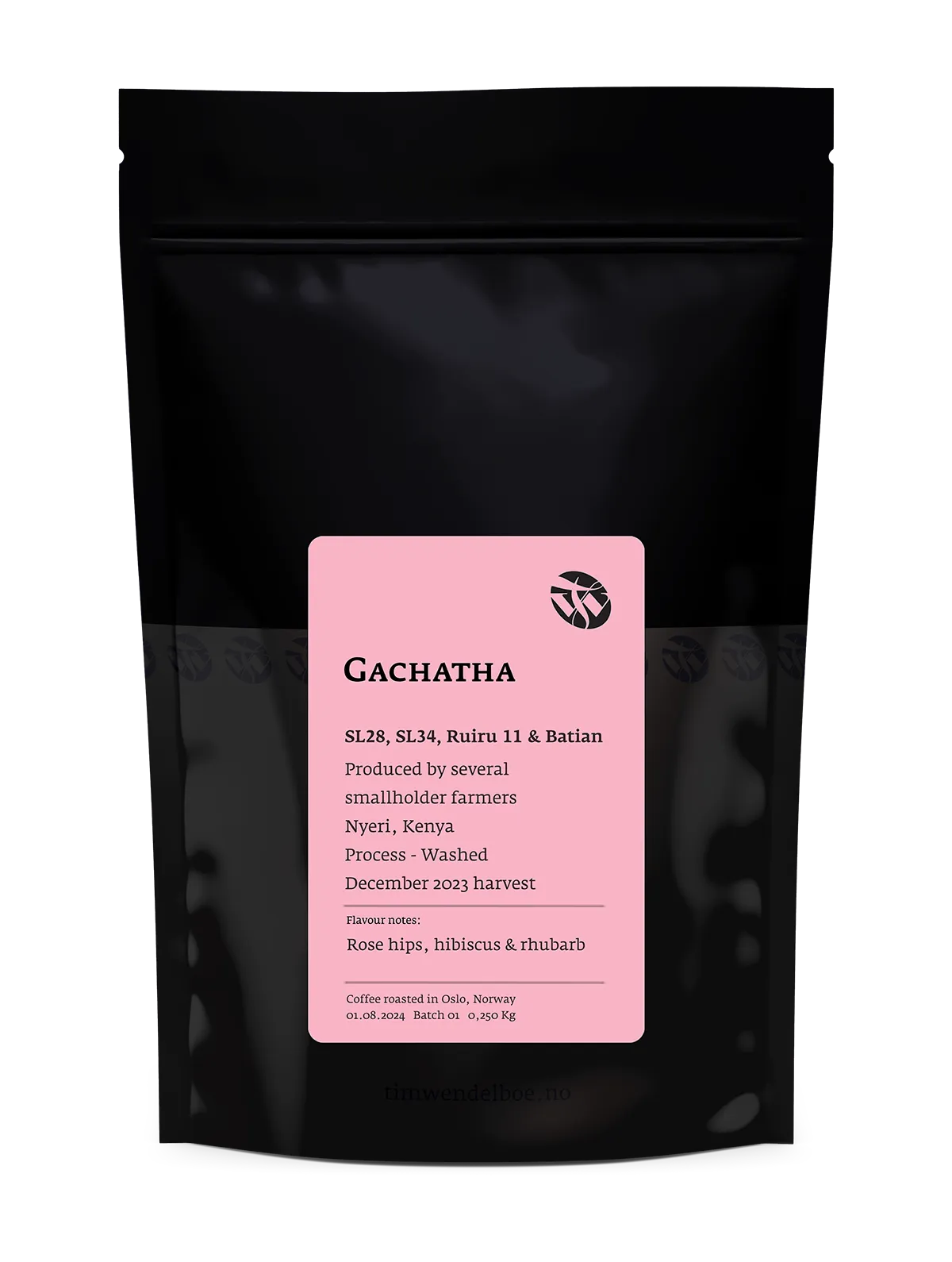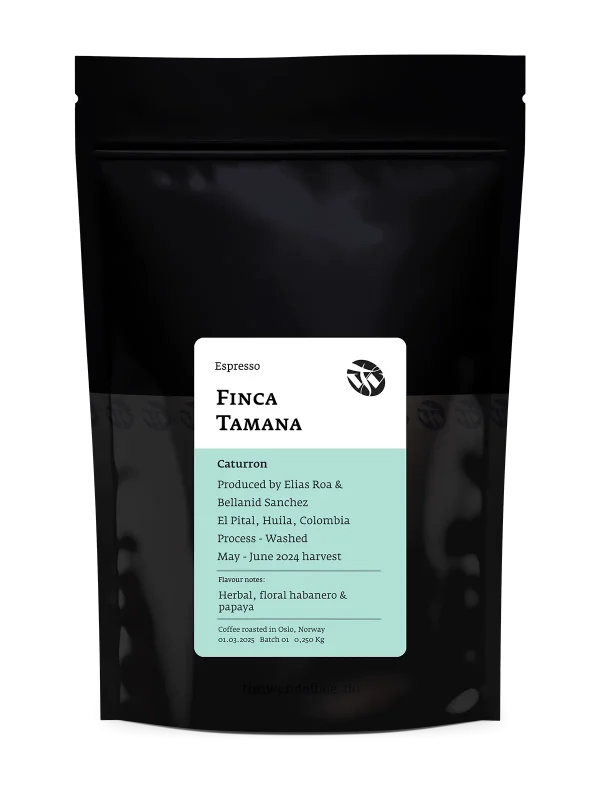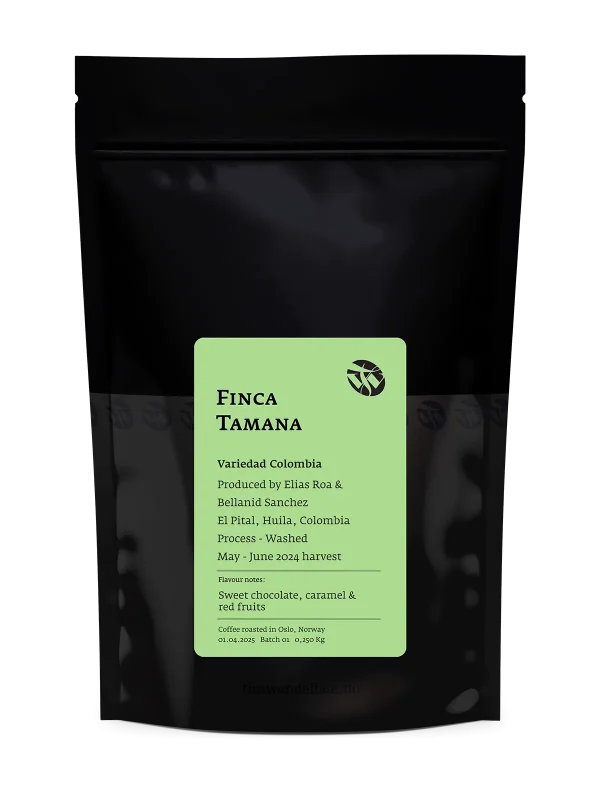| Cultivar | SL28, SL34, Ruiru 11 & Batian |
|---|---|
| Flavour Notes | Rose hips, hibiscus & rhubarb |
| Producer | Several smallholders farmers |
| Country | Kenya |
| Region | Nyeri |
| Process | Washed |
| Harvest | December 2023 |
| Roast Profile | Light Roast |
| Bag Size | 250g |
| Contents | Whole Coffee Beans |
Gachatha
kr205.00
This Kenyan coffee from the Gachatha wet mill has a very distinct and intense fruity flavour with a refreshing acidity. Expect flavours of hibiscus, rose hips and rhubarb.
Out of stock
Additional information
Tim's Notes
The coffees from the Gachatha wet mill has consistently been among the best coffees I have tasted in Kenya over many years and because they produce such consistent high quality there is a big demand for these coffees.
I have visited the Gachatha wet mill several times and been amazed by how much training the cooperative gives to their farmers. They have their own demonstratiopn plot at the wet mill where they can train their members in good agricultural practices and they also grow seedlings of both coffee trees and shade trees that are distributed to their members.
Although most members are still growing the traditional SL28 and SL34 cultivars, we know that they have been planting the new hybrid cultivars Ruiru 11 and a lot of Batian in the recent years. Still the coffee from Gachatha has the recognisable intense fruity flavours with this years coffee maybe leaning towards lighter red fruits. I get notes of hibiscus, rhubarb, rose hips and red berries.
I have visited the Gachatha wet mill several times and been amazed by how much training the cooperative gives to their farmers. They have their own demonstratiopn plot at the wet mill where they can train their members in good agricultural practices and they also grow seedlings of both coffee trees and shade trees that are distributed to their members.
Although most members are still growing the traditional SL28 and SL34 cultivars, we know that they have been planting the new hybrid cultivars Ruiru 11 and a lot of Batian in the recent years. Still the coffee from Gachatha has the recognisable intense fruity flavours with this years coffee maybe leaning towards lighter red fruits. I get notes of hibiscus, rhubarb, rose hips and red berries.
Cultivar
Process
Picking and sorting
- The coffee cherries are typically hand picked by the farmers and their family members. After delivering the coffee cherries to the wet mill the good coffee cherries are separated from the inferior ones by hand sorting and they are delivered in separate cherry hoppers.
- The cherries are depulped and graded by using an old Aagard disc de-pulper that uses water and gravity to sort dense beans from less dense beans. Coffee of different grades are moved to separate fermentation tanks where the parchment coffee, with it’s mucilage still on, is dry fermented for about 12-16 hours over night. After fermentation the coffee is washed in clean water and graded once again by gravity. The more dense beans are dried separately from the beans with lower density and inferior quality.
- The coffees are dried on elevated drying tables, where defect parchment coffee gets sorted out by hand. Drying the coffee takes about 10 – 14 days. During daytime the coffees are raked to ensure even drying. The drying tables are covered during the hottest times of the day to avoid over heating and also at night time to prevent condensation. The drying process is finished when the moisture content in the coffee beans is between 10-12%. After drying, the coffees are stored in conditioning bins before delivery to the dry mill. The coffees we buy from Kenya are always vacuum packed before it is shipped to Norway.
Shipping
For our Norwegian customers, we offer three shipping options:
- Pakke i Postkassen - With Pakke i Postkassen, tracking is provided, and delivery is estimated within 2-3 business days.
- Pakke til hentested - The parcel can be collected from a Post in Store, Post Office, parcel locker, or parcel box. This option includes tracking, with delivery expected within 1-5 business days.
- Norwegian Post, No Tracking (Brevpost) - This option does not offer tracking. Delivery is estimated within 2-5 business days.
How To Brew
Filter
- We strongly recommend using the correct measurements and brewing techniques when you brew our coffees. Use a digital scale both to measure water and coffee in order to get consistent results, and we recommend using between 60 to 70 grams of coffee per litre (1000g) of water, depending on the brewing method, water quality and coffee used.
- We strongly recommend using VST filter baskets. Both the 18g, 20g and the 22g basket is great for our coffee. The VST filters makes it a lot easier to extract the espresso properly which gives a lot more sweetness in the cup. They are also more or less identical to each other which makes it easy to be more consistent when brewing on several groups at the same time. You can buy the filters on our webshop, just make sure they fit your machine (ours fits all La Marzocco machines and machines with 58mm filter baskets). With the VST 18g filter basket, we recommend the following brewing parameters: 18-19g freshly-ground coffee, 25-35s brewing time, 35-38g of final brew liquid in the cup, 93°C-94°C brew water temperature.
Gachatha
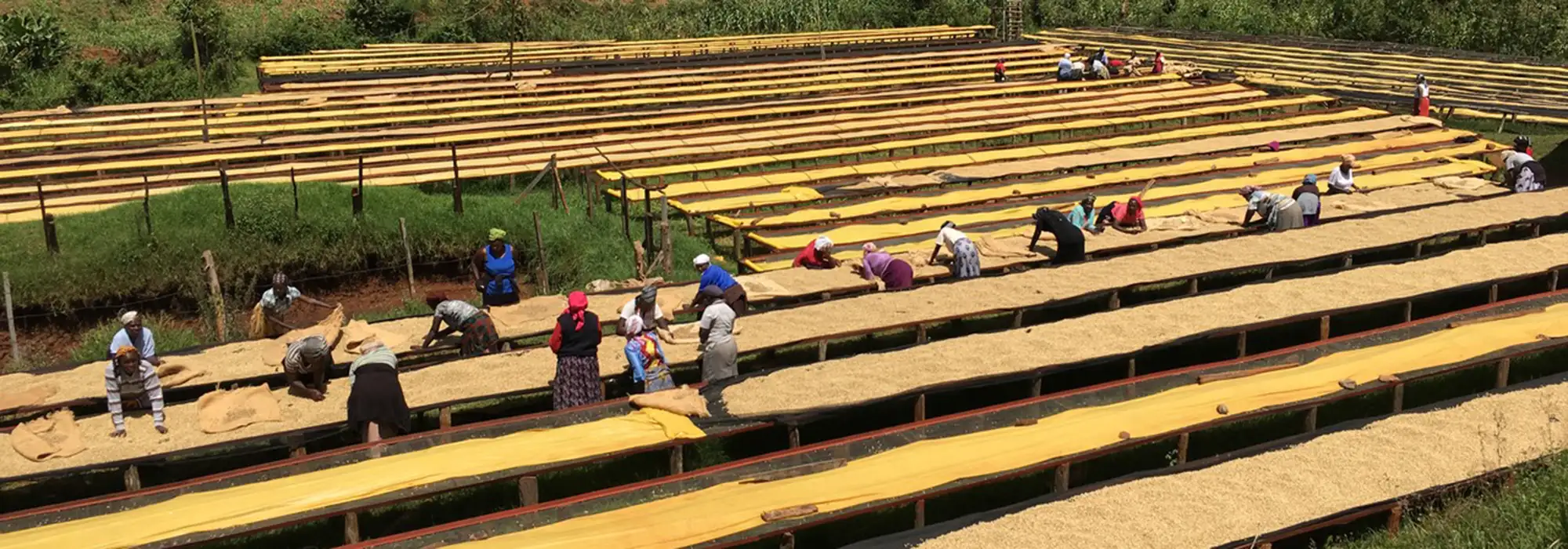
Gachatha is a small co-operative located in Nyeri in Central-Kenya. About 900 active members, or smallholder coffee farmers, deliver coffee cherries to the Gachatha wet mill (or factory as it is called in Kenya.) The cherries get sorted and bulked together and processed at the wet mill and is all supervised by the wet mill manager. Because of this the wet mill will produce many different batches of different qualities as the harvest season goes on between November and December. Each lot that Gachatha produces will normally be sold individually and also graded based on bean density, size and quality. We still belive the best coffees in Kenya do come from co-operatives and Gachatha has consistently been among the top producers of coffees we like for many years.
Transparency
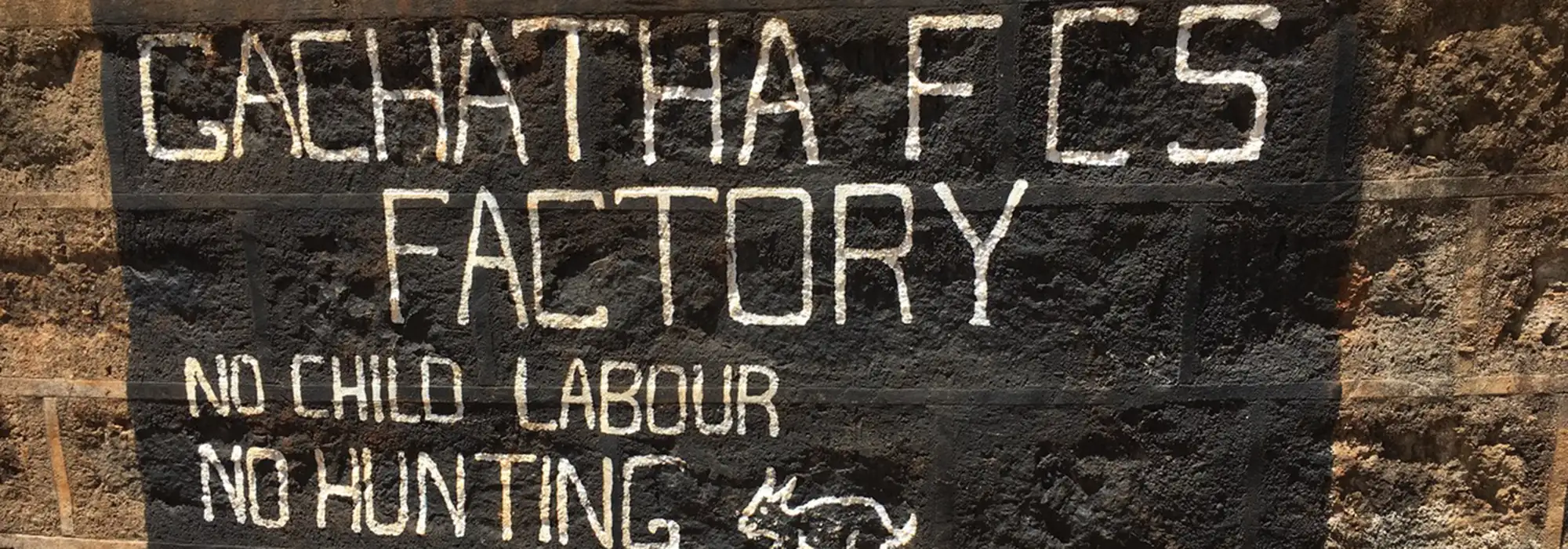
The farmers sell coffee cherries to the wet mills and deliver cherries several times during a harvest. The farmers are paid a price based on all the coffees they sold to the cooperative that year. The wet mill will process and dry the coffees before they get sent to the local mill for storage. Therefore, the cooperative by law charges no more than 20% of the selling price of the coffee. Most of the wet mills we buy from in Kenya publish the prices they paid for their coffees on their notice boards for the farmers to see and everything is recorded in their accounting. However, I still know that we can get better at providing transparency in Kenya and I really hope to step up our buying protocols and find more long term partners in Kenya in the years to come. All coffees are imported directly to Norway by ourselves.
Learn More About Transparency

